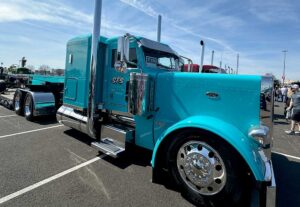By the end of the first week of November, a new administration will be set to take charge of the White House. The outcome of this year’s election is sure to be a topic of hot debate. Regardless of who sits in the Oval Office and what party controls the House and Senate, members of the trucking industry will remain focused on business as usual. The nation’s 3.6 million truck drivers will still be moving freight from Point A to Point B, working to ensure consumers have food on the shelves and that medical facilities are properly supplied. In this Chat with the Chairman, TCA Chairman John Culp shares insights on issues impacting the industry.
Q: In the past weeks, Hurricane Helene has had a huge impact on the Southeastern U.S. with widespread destruction and highways washed away. In what ways is this impacting the trucking industry?
A: I believe companies have been able to reroute most traffic lanes around road closures and freight is moving again, but only essential travel into and within western North Carolina is allowed. The North Carolina DOT is saying that all roads in Western North Carolina should be considered closed, including I-40 and I-26 to Tennessee. Hopefully a few routes will be available by the time this edition of Truckload Authority is out.
The supply chain will remain disrupted, and the route changes come with more miles and time. It will get better as bridges and roads are repaired — but the reality is it is going to take a long time to fully recover. Some reports say it will take over a year to reopen I-40. The roads WILL be repaired, and the supply chain WILL recover, but the losses to the people and families impacted by this devastating and deadly storm are still being felt now, and for many, will be forever.
Q: With heavy trucks unable to even access many storm-damaged areas, how can members of the trucking industry help the victims of this and other disasters?
A: During natural disasters, I am proud to say that the trucking industry is always among the first to respond with relief, delivering water, food, gas, clothing, supplies and building materials.
I have seen reports from state trucking associations in Florida, South Carolina, North Carolina and Alabama where truckers have responded and worked around the clock to deliver essential and critical supplies to people in need. I know that other state associations and truck drivers from all across the country are giving their time and resources also to help our fellow Americans in this time of need.
There are food shortages, water shortages, fuel shortages — basically everything. Many people have lost not just their homes and material possessions, but also family and friends to Helene. Assistance will be needed for a long time.
If you want to help, there are many great charitable organizations on the scene that need your support. One organization that I support is Samaritan’s Purse which is based in Boone, North Carolina. They are responding and providing relief in six locations across four states. There is also a supply chain logistics organization that was created subsequent to Hurricane Katrina, the American Logistics Aid Network (ALAN). They do this with the help of the logistics community who make essential donations of transportation, warehousing, material equipment or expertise.
The cold, hard reality is that this is a long-term deal — and the hurricane and storm season isn’t over yet. It’s going to cause delays and added costs.
Q: At 12:01 a.m. on October 5, with the nation still reeling from the impact of Hurricane Helene, members of the International Longshoremen’s Association (ILA) union at ports along the East and Gulf coasts went on strike. For now, the strike has been put “on hold” and the existing contract extended to January 15, 2024. What are your thoughts on the timing of the strike and its potential impact on the supply chain, and on the truckload industry in particular?
A: First of all, a prolonged strike would have a tremendously negative impact on every link in the supply chain, including the trucking industry. The ILA represents about 45,000 workers in 36 ports from Maine to Texas, and workers from about a dozen of those ports walked.
A temporary truce was called on Oct. 4, and the ILA ordered its members to return to work, at least until after the first of the year. This averted a major crisis during the world’s peak shipping season, when the freight industry is already scrambling to meet the demands of shippers and consumers.
While I respect the union’s right to strike, I do not believe they should be allowed to severely disrupt our country’s supply chain and hold the entire nation hostage — and that’s exactly what they will do if they strike again. According to various sources, it would cost the U.S. economy anywhere from $3.8 to $4.5 billion a day. If an agreement is not reached by the mid-January deadline, the impact could be staggering.
Q: As a refresher, please review the issues between the ILA and the U.S. Maritime Alliance.
A: Certainly. In a nutshell, it comes down to money and job security. The ILA rejected the Alliance’s offer of a 50% wage increase, holding out for a 77% increase over the contract period. The strike was suspended when a tentative agreement was reached that would increase worker’ wages by 62% over the life of the six-year contract. But they still oppose the implementation of any form of automation that could replace human workers. To me, that simply is not feasible! Technological advances and at least some degree of automation are now a part of everyday life.
I don’t have any sympathy for them if they choose to strike again. They have a great deal that will take them through any economic ups and downs for six years. There is no way that truckload trucking companies would or could negotiate a 62% raise to its employees, especially in the difficult economic times we are navigating in.
Q: That leads to my next question. In your opinion, should the federal government involve itself in these or any labor negotiations?
A: The government has the authority to call a halt to strikes and step in to settle labor disputes, and they have done so before. Generally, it’s best for all parties involved that the government NOT be involved. However, when a dispute puts the entire nation’s supply chain at risk, it’s a different situation.
Obviously, if the ports are shut down it prevents both imports and exports, and that can easily lead to disaster around the globe. When the possible impact of a labor dispute is this widespread, I believe the government’s involvement is needed.
I’m hopeful the ILA and the Alliance will reach an agreement and that there won’t be any further disruptions to the supply chain. Time will tell.
Q: Another issue that remains top of mind for the trucking industry is the prevalence of “nuclear” verdicts. We’ve discussed the topic before, but it bears revisiting, especially in light of recent reports of high-dollar awards against transportation companies and equipment manufacturers. Do you have any insights to share?
A: There are three recent cases that immediately come to mind — two equipment manufacturers and a motor carrier.
On September 5, a St. Louis jury awarded a total of $462 million — $450 million in punitive damages and $6 million each to the families of two men who were killed in 2019 when their car crashed into the rear of a tractor-trailer. The suit claimed the manufacturer of the 2004-model trailer, Wabash National, was liable because the trailer did not meet current safety standards.
However, Wabash says, the trailer exceeded safety specifications at the time of its manufacture. In addition, there were extenuating circumstances under which no rear underride guard could have prevented the deaths. The judge did not allow the defense to introduce relevant information that could likely have resulted in a different verdict. According to police records, the car was traveling at 55 mph when it struck the stopped trailer, neither occupant was wearing a seat belt, and the driver was intoxicated.
On September 6, an Alabama jury found Daimler Truck liable to the tune of $160 million in a case filed by the driver of a 2023 Western Star 4700 who was rendered a quadriplegic following a rollover accident. The lawsuit alleged that both the driver’s seat and the roof of the cab were defective and did not meet safety standards. Daimler maintains that its products actually exceed safety standards.
Our legal system is really messed up when juries award “lottery jackpot” verdicts to victims involved in accidents where companies that manufacture goods that meet government safety standards and have no fault in the accident or fatalities.
More recently — and I don’t have all the details — an Arkansas jury hit Kroger Logistics with a $150 million verdict in the death of a 20-year-old firefighter who was struck and killed by a semi-truck after stopping to assist at the scene of an accident.
Unfortunately, accidents happen and sometimes people are seriously or fatally injured. When this happens, our legal system allows the injured party to seek recovery and/or damages from the party who was responsible for the accident. This is a good thing, but nuclear verdicts are out of control and are unsustainable for trucking companies. Our industry must educate the public on what is happening and the impact it has on consumers. These exorbitant costs are being passed on and are showing up in every product that trucking companies haul.
Tort and litigation reform are sorely needed, but it’s an uphill battle. It is generally a state issue, but trucking is regulated by the federal government because of its importance to interstate commerce and trucking accidents should be adjudicated in the federal court system also. This would be a great step forward.
Q: The Environmental Protection Agency’s (EPA) 2027 deadline in the journey to zero emissions is growing closer. What are your thoughts on shifting the trucking industry away from diesel engines toward battery-electric power?
A: First of all, the price of a battery-electric truck is two to three times more than a regular diesel, so of course, the cost of transportation is going to jump. Then there’s the fact that the nation’s power grid is nowhere near ready to handle the charging stations. Different parts of the country struggle with electricity shortages on a regular basis, so where will all the power needed to charge these trucks come from?
Even if the charging infrastructure were already in place, there are other problems. These batteries take several hours to charge, and today drivers can’t be in the vehicle while it’s charging. So, those four to 10 hours of charging time will have to be logged as on-duty time for drivers. That’s a tremendous loss of time, especially when the range of electric trucks is so limited.
There are countless other hurdles too, like the cost of tires. Electric vehicles are hard on tires, with all the starting and stopping, plus the added weight of the battery. I’ve talked to a few drivers who are running electric trucks, and they’ve mentioned that the tire wear is awful.
Q: We’ve been hearing a lot about advances in the field of the internal combustion engine (ICE), with manufacturers working to produce engines that can be powered by alternative fuel sources. Could this be a viable alternative to reduce emissions in trucking?
A: Engines powered by renewable diesel will literally give us the most bang for the buck — and in addition, offer a substantial reduction in life cycle carbon emissions over battery electric vehicles. ICEs should be an integral part of a comprehensive long-term solution in meeting our environmental responsibilities.
Q: How is TCA working to find solutions for the trucking industry, not only regarding emissions, but also other issues?
A: At TCA, we’re working very hard to bring issues to light on Capitol Hill. In addition to meetings throughout the year, we set aside a day each fall for our Call on Washington and visit with legislators and their staffs about real-world solutions. Emissions and EPA regulations were a huge part of this year’s conversations on the Hill.
As an industry, it’s very important that we work with the leaders in Washington to advance the issues that are important to us. Our job is to work with whoever is in power to provide information relevant to trucking and advocate for the industry and the supply chain as a whole.
I would say that one of TCA’s best value propositions for our members is providing a voice in Washington. Effecting change takes time and effort. We want to bring about productive safety improvements in the industry. We want the supply chain to be more efficient.
Q: I’m sure the TCA team is already hard at work to plan next year’s annual convention. Do you have information to share?
A: Truckload 2025 is set for March 15-18 in Phoenix. It’s going to be a great program, and I encourage every member to attend. In addition to unbeatable educational opportunities, we’ll be featuring inspiring speakers and plenty of opportunities for benchmarking and networking. As always, the exhibit hall will showcase the latest trends and technologies, along with business solutions to help your company thrive.
One of TCA’s primary objectives is to help our members be financially sustainable. With that in mind, we work to ensure our meetings and conventions are beneficial as well as entertaining.
Q: The holidays are almost upon us. Do you have any thoughts to share with TCA members?
A: It’s been a challenging year, and the truckload industry is facing more uncertainty in the coming year. I don’t know when things will get better, but I know that they will.
As I think about the blessings I’ve been given, I’m thankful for the TCA membership, the trucking industry as a whole and, especially, the drivers who are out there on the nation’s highways delivering freight every day. We have a lot to be proud of in trucking, and a lot to be thankful for.
I hope everyone has a blessed holiday season through Thanksgiving, Christmas and the many other observances through the new year.
Thank you, Mr. Chairman. I wish you the happiest of holidays, and I look forward to our first visit in the New Year.
Linda Garner-Bunch has been in publishing for more than 30 years. You name it, Linda has written about it. She has served as an editor for a group of national do-it-yourself publications and has coordinated the real estate section of Arkansas’ only statewide newspaper, in addition to working on a variety of niche publications ranging from bridal magazines to high-school sports previews and everything in between. She is also an experienced photographer and copy editor who enjoys telling the stories of the “Knights of the Highway,” as she calls our nation’s truck drivers.








